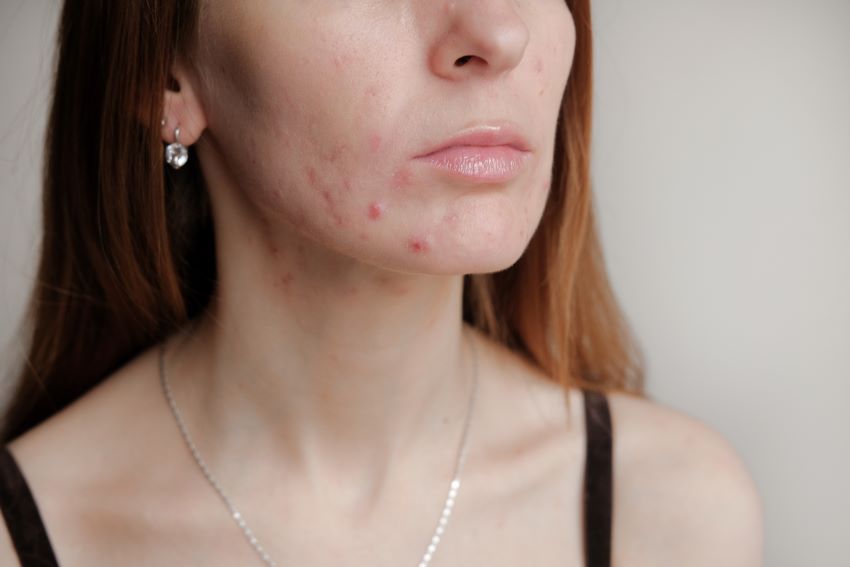How To Fix Hormonal Imbalance Causing Acne
 Acne
Acne What is Hormonal Acne? Hormonal Acne Treatment
Hormonal acne (also known as adult acne) is acne caused by genetic and hormonal factors that cause breakouts well past puberty and the teenage years. Hormonal acne occurs more often in women and is typically located on the lower part of the face. Breakouts happen along the jawline, the chin, and the perioral region (the area surrounding the mouth). The breakouts consist of inflammatory lesions, cysts, whiteheads, and blackheads.
Genetics
When it comes to adult acne, genes have proven to play a role in its existence. Genetics influence the number, size, and activity of the sebaceous glands; the sebaceous glands are the oil glands in the skin that create sebum (oil), can get clogged, and cause breakouts.
Hormones
The two hormones that need to work harmoniously together when it comes to clear skin are androgens and estrogen hormones. Androgens (Testosterone, Dehydroepiandrosterone Sulfate, and Dihydrotestosterone) stimulate sebaceous gland growth and increase sebum production. Estrogens work in the opposite way and slow sebum production. So when androgen levels are abnormally high, breakouts occur often. Similarly, when estrogen levels are lower especially during the premenstrual period in women, acne is more likely to occur.
The most common reasons for hormonal acne breakouts are:
- Menstruation
- Menopause
- High androgen levels
- Starting or weaning off oral contraceptive pills
Other factors that can increase adult acne are poor diet, drugs, stress, tobacco, and endocrine diseases.
Hormonal Acne Treatment
There are a few treatment options on how to get rid of hormonal acne.
Topical Treatment
The first option is the use of topical treatments. This option is the most popular and effective when treating mild forms of acne. Your dermatologist will likely prescribe or recommend an over-the-counter version of one of the following:
- Retinoids
- Antibiotics
- Benzoyl Peroxide
- Azelaic Acid
- Dapsone
Your dermatologist may also recommend a combination of any of the above ingredients in order to maximize effectiveness in reducing acne.
Oral Medication
The second treatment option for more severe or persistent hormonal acne is oral medication.
- Antibiotics
- Lymecycline
- Doxycycline
- Minocycline
- Hormones
- Androgen Receptor Blockers
- Cyproterone Acetate
- Spironolactone
- Drospirenone
- Flutamide
Natural Treatment
There are some natural ways to treat hormonal acne.
- Dietary Changes
- Limiting dairy, artificial sugars, alcohol, red meat, and overly processed grains (white bread, pasta, desserts) can help to lower inflammation and reduce breakouts.
- Tea Tree Oil
- This oil can be applied topically to dry out the sebaceous glands and decrease inflammation.
- Exfoliate
- Exfoliating the skin with a brush or a harsher scrub will remove the top layer of skin and unclog pores.
- Fish Oil Supplement
- Fish oil contains Omega-3 fatty acids that decrease inflammation in the skin and increase hydration without clogging pores and causing breakouts.
Medical Procedures
Medical Procedures are another treatment option that are typically used to remove the top layer of skin that contains acne, dirt, oil, and other pollutants on the skin. Options include:
- Microdermabrasion
- Chemical peels
- Phototherapy
- Laser Therapy
The most intense, and well-known treatment option for hormonal therapy when all else has failed is Isotretinoin (Accutane). This drug is only used when acne is severe as its side effects are incredibly intense. According to the American Academy of Dermatology, your dermatologist will only send this prescription to your acne pharmacy if you:
- Enroll in a program from the U.S. Food and Drug Administration (FDA)
- See your dermatologist for follow-up visits
- Sign forms that state you know the risks of taking isotretinoin
Overall, hormonal acne can wreak havoc on your emotional and physical well-being. It is a very difficult condition to manage on your own, so we encourage you to reach out to your dermatologist who will work with you to find a treatment that works! Contact us today to learn more about other acne conditions and treatment solutions.
How To Fix Hormonal Imbalance Causing Acne
Source: https://www.apothecopharmacy.com/blog/what-is-hormonal-acne-hormonal-acne-treatment/
Posted by: griggsnour1949.blogspot.com

0 Response to "How To Fix Hormonal Imbalance Causing Acne"
Post a Comment